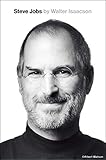 Back in 2011, my cousin bought me a copy of Steve Jobs by Walter Isaacson for Christmas. The biography had been released a couple of months earlier, less than three weeks after Jobs’s death, and had become an immediate bestseller — one of those books that makes the transitional leap from the bookstore to the “impulse-buy” shelf by the supermarket checkout, and the kind of thing I snobbishly regard with suspicion while waiting to pay for my kale.
Back in 2011, my cousin bought me a copy of Steve Jobs by Walter Isaacson for Christmas. The biography had been released a couple of months earlier, less than three weeks after Jobs’s death, and had become an immediate bestseller — one of those books that makes the transitional leap from the bookstore to the “impulse-buy” shelf by the supermarket checkout, and the kind of thing I snobbishly regard with suspicion while waiting to pay for my kale.
I really had no notion as to why my cousin would choose to buy this particular book for me. I am not only something of a luddite, but am also a sworn enemy of Apple, the company which Jobs co-founded. During my teenage years, I spent most of my savings on an iPod Mini, only for the battery to die after 11 months. Although it was covered by a one-year warranty, when I made my claim they told me that for battery-related issues the warranty is a mere six months, and that the cost for one of their technicians to replace the battery would be almost as much as the iPod itself. After that experience, I swore I would never buy another of their overpriced products again, and have held a deep personal grudge against Jobs and his cohort ever since.
Thus when I opened the wrapping paper on that Christmas afternoon five years ago to find myself confronted by the arrogant stare of Steve Jobs, I smiled and said a polite word of thanks, and then immediately disregarded the book, exiling it to a bottom corner of my bookshelf, where it has been gathering dust ever since.
Earlier this year, for my birthday, I received a copy of the recent Danny Boyle/Aaron Sorkin film Steve Jobs on DVD. (Yes, I still watch DVDs. I told you I was a luddite.) Although the subject of Jobs did not strike me as being any more interesting in 2016 than it did in 2011, and I still had not forgiven him for the iPod Mini incident, it seemed as though some invisible hand in the universe was intent on forcing him into my life, and so, encouraged by the row of five-star reviews on the DVD cover, I decided to give it a chance.
I ended up being surprised not only by how much I enjoyed the film, but how interesting I found the historical context of Apple and the early days of developing computer technology. The film stayed in my mind for a few days, and, becoming unexpectedly eager to dig a little deeper into the facts behind the fictionalized Sorkinese dialogue, I decided to commit myself to trying out the 600-page Isaacson tome on the much-mythologized Jobs.
Lo and behold, the book I had not given a second glance half a decade ago ended up being one of my favorite books of 2016. That is not to say that it converted me to the Church of Apple, but it introduced me to new perspectives on technology that I had not previously considered, such as why Jobs believed it was essential that the iPod Mini had no convenient flap to easily replace a dead battery, and the advantages and disadvantages that stem from this “closed system” model. Jobs never wanted the seams or screws to be visible on any of his products, wishing them to be complete entities in themselves, which could not be corrupted by any inferior outside components. This approach yielded great success for Apple, and helped bring a sense of beauty into the world of computing, which had previously been dominated by clunky and unattractive machines.
As someone who has grown up in the age of computer technology, I suppose I had never questioned many of these digital facts of life before. To me, elements such as the great Apple/Microsoft divide have simply always been part of the natural order of things, and it had never really occurred to me how intertwined the destinies of the two companies have been, and how the progress of computer technology might have turned out entirely differently had either one of them not existed.
I learned more from Isaacson’s biography than I have from a single book in a long time, simply by virtue of the fact that it concerned a subject I previously knew nothing about and assumed I had no interest in. It is a credit to Isaacson that he manages to make the complex evolving world of computer technology so accessible and fascinating to a novice like me; when he concludes that Jobs will be placed “in the pantheon next to Edison and Ford” I can now see where he is coming from, where previously I would have, in my ignorance, snorted in disbelief at the notion.
The Edison and Ford comparison strikes me as particularly apt, in that Jobs was not necessarily the greatest engineer himself, but seems to have had the clairvoyant ability to see the potential in other people’s inventions and predict what the customer wanted before they themselves knew. With this greatness came a darker side to his personality, which allowed him to take credit for other people’s ideas, berate his employees for not being able to meet his impossible standards, and neglect his familial responsibilities. Isaacson does not shy away from these more negative qualities, and is able to portray the complexity of Jobs — a man you may admire, but would probably not invite to your home for dinner — while also preserving that aura of enigma which inevitably surrounds anyone who achieves things that defy easy explanation.
 Steve Jobs was not necessarily my favorite book of the year (that title would probably go to Stefan Zweig’s Beware of Pity) but it affected me in the most significant way, and will probably be the book I end up recommending most often. It is a book which, for one pretentious reason or another, I considered to be outside of the realm of my interest, and it never would have occurred to me to read it had it not fallen into my lap.
Steve Jobs was not necessarily my favorite book of the year (that title would probably go to Stefan Zweig’s Beware of Pity) but it affected me in the most significant way, and will probably be the book I end up recommending most often. It is a book which, for one pretentious reason or another, I considered to be outside of the realm of my interest, and it never would have occurred to me to read it had it not fallen into my lap.
It also reminded me of something that is easily forgotten: namely, that the unexpected book has the greatest potential to surprise you, and offers the greatest potential for learning outside of one’s normal cultural sphere. Without even noticing it, many of us are guilty of trapping ourselves into small pockets of literature.
So, inspired by my enjoyment of Steve Jobs, I am making a New Year’s resolution to embrace the unexpected book; to make an effort to read things I have never heard of, on subjects I know nothing about. If 2016 was able to introduce me to the book that would finally allow me to forgive Steve Jobs for the iPod Mini, I’m looking forward to seeing how my mind will be changed by the unexpected books of 2017.









